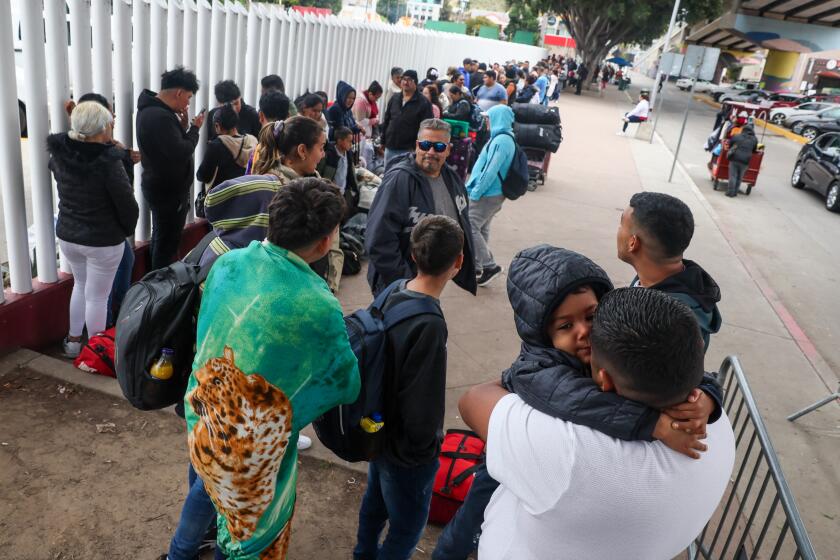A uniquely American DREAM
Thoughtful people will disagree about immigration policy -- how many foreigners to let in, for what purpose, and what to do about the 12 million illegal immigrants already in this country. That’s why sweeping immigration reform has failed again and again. This fall, Congress should think smaller, and figure out what it can agree on, before another year passes with no progress. It might start by considering young people like Lucia.
When Lucia’s parents dropped her off at a new elementary school in Los Angeles more than 15 years ago, she didn’t speak a word of English. And she didn’t really know why she was in the United States. Before the family left Mexico, Lucia’s parents said they were all going to Disneyland. Then they arrived here and stayed.
But Lucia was a smart kid, and when she figured out that she’d be here for a while, she tried to make the best of it. She stopped speaking Spanish. By seventh grade, she made it from remedial English classes to the gifted-and-talented program. She joined the California Cadet Corps, a kind of junior ROTC. She was voted queen of her high school prom and named valedictorian of her graduating class. She had a plan. She wanted to enlist in the Marines, go to college and apply to work for the CIA -- she liked spy movies.
In her senior year, Lucia’s parents sat her down. They told her they had come to the United States illegally all those years ago. That meant she was an illegal immigrant too, ineligible for military service, in-state tuition, public financial aid, even most scholarships.
Lucia was stunned. She thought she was a normal American teenager, thought she belonged here. The Latino kids at school actually called her gringa -- white girl -- for her light skin and the way she talked and studied. What was she supposed to do? Leave her home, move to Mexico, be an immigrant all over again? Give up on school, work as a cleaning lady or a nanny and live a life in hiding?
She felt sick, panicked. But she wasn’t the type to give up. So she signed up for community college, working three jobs to pay for her classes. When California passed a law in 2001 extending in-state tuition to kids who had attended a California high school for more than three years, regardless of their citizenship status, she transferred to UCLA.
She graduated two years ago. But she couldn’t apply for a paying, professional job and start returning America’s investment in her. So she lived with her parents and volunteered as an unpaid intern at a local nonprofit. And she waited.
Illegal immigration is a complicated problem. Lucia’s parents broke the law to come here. Eventually Congress is going to have to decide what to do about them and millions of others like them. But Americans don’t punish children for the sins of their parents, and in this case, we share some responsibility. We have spent the last 20 years mostly ignoring our broken immigration system. While we dithered and delayed, kids were growing up.
At UCLA, I’ve met undocumented students who were brought to the United States as infants, and others who arrived so long ago that English is the only language they speak without an accent. It makes no sense to deport these kids now -- and realistically, we won’t, not more than a handful. It makes just as little sense to keep them here in illegal, unskilled jobs.
A bill called the DREAM Act recognizes that fact. Proposed by Utah Republican Sen. Orrin G. Hatch and sponsored by broad, bipartisan coalitions in the House and Senate (including five presidential candidates), the DREAM Act is simple and pragmatic: If a kid like Lucia has grown up in the United States and graduated from high school, she earns conditional citizenship. If she graduates from college or serves in the military, she earns the right to stay. Unlike broad amnesty proposals, which critics say apply mostly to low-wage foreign workers, the DREAM Act offers citizenship only to kids who were brought up in the U.S. and are poised to become taxpaying members of the middle class.
There are immigration problems that demand our full attention: lax border security; human trafficking; fraud; whole economies, like agriculture, built upon a shadow workforce. Spending scarce time and money to try to root out young people like Lucia shouldn’t be anyone’s priority.
The DREAM Act has gotten tangled up in the push for comprehensive immigration reform, tacked onto one complicated bill after another. Each one collapsed over more controversial ideas. Now, for the first time, the bill is expected to see a vote separate from sweeping immigration proposals. It is an easy piece of immigration reform, with a fundamentally American solution: an opportunity for good kids to prove themselves and earn their place here.
More to Read
Get the L.A. Times Politics newsletter
Deeply reported insights into legislation, politics and policy from Sacramento, Washington and beyond. In your inbox three times per week.
You may occasionally receive promotional content from the Los Angeles Times.






